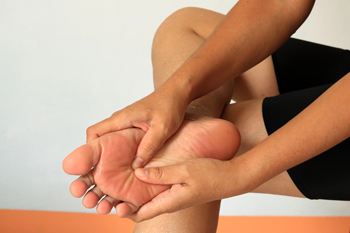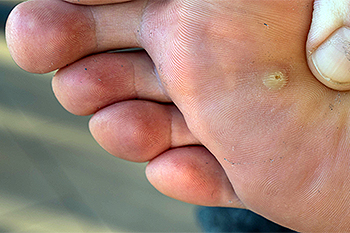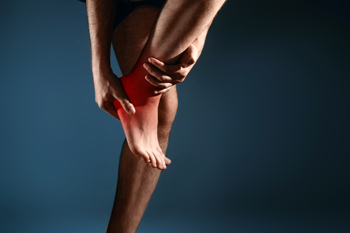Blog
Items filtered by date: April 2022
What Does a Podiatrist Do?

A podiatrist is a medical doctor who specializes in the treatment of the many conditions that affect your toes, feet, and ankles. Podiatrists have a degree in medicine and have undergone further training in their specialty. Their main job is to promote mobility and activity, reduce pain, and treat infections related to the feet and ankles. They handle simple cases, including corns and calluses, ingrown toenails, fungal infections, and plantar warts, to name a few. Podiatrists also treat more complex problems, such as bunions and heel pain (plantar fasciitis), as well as ankle sprains, Achilles tendon injuries, and broken bones. Podiatrists can help with orthotics for specific foot problems as well as offer treatment for people with chronic conditions that can seriously affect the feet, such as diabetes, peripheral artery disease, and peripheral neuropathy. If you have any foot, toe, or ankle ailment, it is a good idea to seek the help of a podiatrist for a full examination, a diagnosis, and treatment options.
If you are experiencing pain in the feet or ankles, don’t join the stubborn majority refusing treatment. Feel free to contact one of our doctors from Favor Foot Ankle Leg & Wound Center. Our doctors can provide the care you need to keep you pain-free and on your feet.
What Is a Podiatrist?
Someone would seek the care of a podiatrist if they have suffered a foot injury or have common foot ailments such as heal spurs, bunions, arch problems, deformities, ingrown toenails, corns, foot and ankle problems, etc.
Podiatric Treatment
A podiatrist will treat the problematic areas of the feet, ankle or lower leg by prescribing the following:
- Physical therapy
- Drugs
- Orthotic inserts or soles
- Surgery on lower extremity fractures
A common podiatric procedure a podiatrist will use is a scanner or force plate which will allow the podiatrist to know the designs of orthotics. Patients are then told to follow a series of tasks to complete the treatment. The computer will scan the foot a see which areas show weight distribution and pressure points. The podiatrist will read the analysis and then determine which treatment plans are available.
If you have any questions please feel free to contact our office located in South Amboy, NJ . We offer the newest diagnostic and treatment technologies for all your foot and ankle needs.
Three Types of Nerves
 The group of nerves that connect the central nervous system to the rest of the body is known as the peripheral nervous system. There are three groups of nerves within this system, known as motor, sensory, and autonomic. If the nerves become damaged from an injury, infection, or specific medications, peripheral neuropathy may result. This can alter how the nerves normally function. The symptoms of motor neuropathy can include twitching, paralysis, or muscle cramps. Additionally, a tingling sensation, or a loss of balance may be indicative of sensory neuropathy. Autonomic neuropathy symptoms can consist of dizziness from low blood pressure, constipation, or bloating. Research has shown it may be beneficial to monitor glucose levels, and it can help to protect your feet by wearing shoes and socks. If you have any of these symptoms that are affecting your feet, it is suggested that you consult with a podiatrist who can properly diagnose neuropathy, and offer correct treatment options.
The group of nerves that connect the central nervous system to the rest of the body is known as the peripheral nervous system. There are three groups of nerves within this system, known as motor, sensory, and autonomic. If the nerves become damaged from an injury, infection, or specific medications, peripheral neuropathy may result. This can alter how the nerves normally function. The symptoms of motor neuropathy can include twitching, paralysis, or muscle cramps. Additionally, a tingling sensation, or a loss of balance may be indicative of sensory neuropathy. Autonomic neuropathy symptoms can consist of dizziness from low blood pressure, constipation, or bloating. Research has shown it may be beneficial to monitor glucose levels, and it can help to protect your feet by wearing shoes and socks. If you have any of these symptoms that are affecting your feet, it is suggested that you consult with a podiatrist who can properly diagnose neuropathy, and offer correct treatment options.
Neuropathy
Neuropathy can be a potentially serious condition, especially if it is left undiagnosed. If you have any concerns that you may be experiencing nerve loss in your feet, consult with one of our doctors from Favor Foot Ankle Leg & Wound Center. Our doctors will assess your condition and provide you with quality foot and ankle treatment for neuropathy.
What Is Neuropathy?
Neuropathy is a condition that leads to damage to the nerves in the body. Peripheral neuropathy, or neuropathy that affects your peripheral nervous system, usually occurs in the feet. Neuropathy can be triggered by a number of different causes. Such causes include diabetes, infections, cancers, disorders, and toxic substances.
Symptoms of Neuropathy Include:
- Numbness
- Sensation loss
- Prickling and tingling sensations
- Throbbing, freezing, burning pains
- Muscle weakness
Those with diabetes are at serious risk due to being unable to feel an ulcer on their feet. Diabetics usually also suffer from poor blood circulation. This can lead to the wound not healing, infections occurring, and the limb may have to be amputated.
Treatment
To treat neuropathy in the foot, podiatrists will first diagnose the cause of the neuropathy. Figuring out the underlying cause of the neuropathy will allow the podiatrist to prescribe the best treatment, whether it be caused by diabetes, toxic substance exposure, infection, etc. If the nerve has not died, then it’s possible that sensation may be able to return to the foot.
Pain medication may be issued for pain. Electrical nerve stimulation can be used to stimulate nerves. If the neuropathy is caused from pressure on the nerves, then surgery may be necessary.
If you have any questions, please feel free to contact our office located in South Amboy, NJ . We offer the newest diagnostic and treatment technologies for all your foot care needs.
Let the Expert Treat Your Ingrown Toenails
What Causes My Feet to Burn?
If you sometimes experience redness and burning in your feet, as well as other body parts, you may have a disorder known as erythromelalgia. Flare-ups, which can last for days, usually start out as itching, which then becomes burning pain, redness and mottled skin. Erythromelalgia can affect your ability to stand, exercise and sleep. Its symptoms may be triggered by an increase in body temperature after exercising, wearing warm socks, being dehydrated, or even eating spicy food. The cause for most people is unknown, but erythromelalgia has been linked to several underlying conditions, including peripheral neuropathy, rheumatoid arthritis and lupus. It also may be triggered by taking certain medications. Self-treatment is not recommended, as it may lead to more serious problems. Instead, if you think this condition is affecting your feet, as well as limiting your daily activities, it is wise to seek the counsel of a podiatrist for analysis and possible treatment options.
When dealing with systemic disease of the feet, it is extremely important to check the affected areas routinely so that any additional problems are caught quickly. If you have any concerns about your feet and ankles contact one of our doctors from Favor Foot Ankle Leg & Wound Center. Our doctors will assist you with all of your podiatric needs.
Systemic Diseases of the Feet
Systemic diseases affect the whole body, and symptoms usually are displayed in the feet. This condition can make a patient’s ability to walk unbearable. Systemic diseases include gout, diabetes mellitus, neurological disorders, and arthritis.
Gout – is caused by an excess of uric acid in the body. Common symptoms include pain, inflammation, and redness at the metatarsal/phalangeal joint of the base big toe. Gout can be treated by NSAIDs to relieve pain and inflammation, and other drugs that lower the acid levels in the body.
Diabetes mellitus – is an increase in the level of blood sugar that the body cannot counteract with its own insulin. Failure to produce enough insulin is a factor in Diabetes.
Diabetes of the Feet
Diabetic Neuropathy – may lead to damaged nerves and affect the feet through numbness and loss of sensation.
Peripheral Vascular Disease – can restrict the blood flow to the feet, and often times lead to amputation of the feet.
If you have any questions please feel free to contact our office located in South Amboy, NJ . We offer the newest diagnostic and treatment technologies for all your foot and ankle needs.
What Causes Plantar Warts?
 Plantar warts develop on the bottom of the feet. They grow into the skin as a result of pressure that is exerted while walking or running. They can cause severe pain and discomfort, and it can be difficult to complete daily activities. Plantar warts are associated with the human papillomavirus (HPV) and live in warm and moist areas. These can include shower room floors, public pools, and locker rooms. The virus can enter the body through small cracks in the skin and wearing appropriate shoes while in these environments can help to reduce exposure. The wart appears to be a thickened area of hard skin, and they often have small black dots in the center. There are several treatment methods available, and it is strongly advised that you consult with a podiatrist if you are afflicted with plantar warts.
Plantar warts develop on the bottom of the feet. They grow into the skin as a result of pressure that is exerted while walking or running. They can cause severe pain and discomfort, and it can be difficult to complete daily activities. Plantar warts are associated with the human papillomavirus (HPV) and live in warm and moist areas. These can include shower room floors, public pools, and locker rooms. The virus can enter the body through small cracks in the skin and wearing appropriate shoes while in these environments can help to reduce exposure. The wart appears to be a thickened area of hard skin, and they often have small black dots in the center. There are several treatment methods available, and it is strongly advised that you consult with a podiatrist if you are afflicted with plantar warts.
Plantar warts can be very uncomfortable. If you need your feet checked, contact one of our doctors from Favor Foot Ankle Leg & Wound Center. Our doctors will assist you with all of your foot and ankle needs.
About Plantar Warts
Plantar warts are the result of HPV, or human papillomavirus, getting into open wounds on the feet. They are mostly found on the heels or balls of the feet.
While plantar warts are generally harmless, those experiencing excessive pain or those suffering from diabetes or a compromised immune system require immediate medical care. Plantar warts are easily diagnosed, usually through scraping off a bit of rough skin or by getting a biopsy.
Symptoms
- Lesions on the bottom of your feet, usually rough and grainy
- Hard or thick callused spots
- Wart seeds, which are small clotted blood vessels that look like little black spots
- Pain, discomfort, or tenderness of your feet when walking or standing
Treatment
- Freezing
- Electric tool removal
- Laser Treatment
- Topical Creams (prescription only)
- Over-the-counter medications
To help prevent developing plantar warts, avoid walking barefoot over abrasive surfaces that can cause cuts or wounds for HPV to get into. Avoiding direct contact with other warts, as well as not picking or rubbing existing warts, can help prevent the further spread of plantar warts. However, if you think you have developed plantar warts, speak to your podiatrist. He or she can diagnose the warts on your feet and recommend the appropriate treatment options.
If you have any questions please feel free to contact our office located in South Amboy, NJ . We offer the newest diagnostic and treatment technologies for all your foot and ankle needs.
Blog Archives
- August 2025
- July 2025
- June 2025
- May 2025
- April 2025
- March 2025
- February 2025
- January 2025
- December 2024
- November 2024
- October 2024
- September 2024
- August 2024
- July 2024
- June 2024
- May 2024
- April 2024
- March 2024
- February 2024
- January 2024
- December 2023
- November 2023
- October 2023
- September 2023
- August 2023
- July 2023
- June 2023
- May 2023
- April 2023
- March 2023
- February 2023
- January 2023
- December 2022
- November 2022
- October 2022
- September 2022
- August 2022
- July 2022
- June 2022
- May 2022
- April 2022
- March 2022
- February 2022
- January 2022
- December 2021
- November 2021
- October 2021
- September 2021
- August 2021
- July 2021
- June 2021
- May 2021
- April 2021
- March 2021
- February 2021


